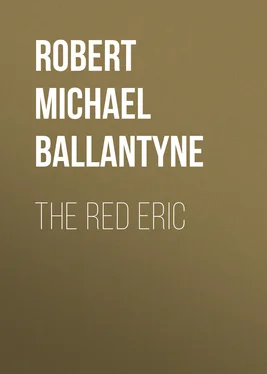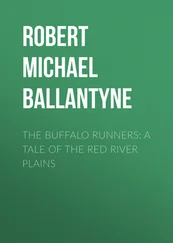Robert Michael Ballantyne - The Red Eric
Здесь есть возможность читать онлайн «Robert Michael Ballantyne - The Red Eric» — ознакомительный отрывок электронной книги совершенно бесплатно, а после прочтения отрывка купить полную версию. В некоторых случаях можно слушать аудио, скачать через торрент в формате fb2 и присутствует краткое содержание. Жанр: Детские приключения, literature_19, foreign_antique, foreign_prose, foreign_children, на английском языке. Описание произведения, (предисловие) а так же отзывы посетителей доступны на портале библиотеки ЛибКат.
- Название:The Red Eric
- Автор:
- Жанр:
- Год:неизвестен
- ISBN:нет данных
- Рейтинг книги:4 / 5. Голосов: 1
-
Избранное:Добавить в избранное
- Отзывы:
-
Ваша оценка:
- 80
- 1
- 2
- 3
- 4
- 5
The Red Eric: краткое содержание, описание и аннотация
Предлагаем к чтению аннотацию, описание, краткое содержание или предисловие (зависит от того, что написал сам автор книги «The Red Eric»). Если вы не нашли необходимую информацию о книге — напишите в комментариях, мы постараемся отыскать её.
The Red Eric — читать онлайн ознакомительный отрывок
Ниже представлен текст книги, разбитый по страницам. Система сохранения места последней прочитанной страницы, позволяет с удобством читать онлайн бесплатно книгу «The Red Eric», без необходимости каждый раз заново искать на чём Вы остановились. Поставьте закладку, и сможете в любой момент перейти на страницу, на которой закончили чтение.
Интервал:
Закладка:
But, although Ailie delighted in the storm, she infinitely preferred the tranquil beauty and rest of a “great calm,” especially at the hour just before sunrise, when the freshness, brightness, and lightness of the young day harmonised peculiarly with her elastic spirit. It was at this hour that we find her alone upon the bulwarks of the Red Eric .
There was a deep, solemn stillness around, that irresistibly and powerfully conveyed to her mind the idea of rest. The long, gentle undulation of the deep did not in the least detract from this idea. So perfect was the calm, that several masses of clouds in the sky, which shone with the richest saffron light, were mirrored in all their rich details as if in a glass. The faintest possible idea of a line alone indicated, in one direction, where the water terminated and the sky began. A warm golden haze suffused the whole atmosphere, and softened the intensity of the deep-blue vault above.
There was, indeed, little variety of object to gaze upon—only the water and the sky. But what a world of delight did not Ailie find in that vast sky and that pure ocean, that reminded her of the sea of glass before the great white throne, of which she had so often read in Revelation. The towering masses of clouds were so rich and thick, that she almost fancied them to be mountains and valleys, rocks and plains of golden snow. Nay, she looked so long and so ardently at the rolling mountain heights in the sky above, and their magical counterparts in the sky below, that she soon, as it were, thought herself into Fairyland, and began a regular journey of adventures therein.
Such a scene at such an hour is a source of gladsome, peaceful delight to the breast of man in every stage of life; but it is a source of unalloyed, bounding, exhilarating, romantic, unspeakable joy only in the years of childhood, when the mind looks hopefully forward, and before it has begun—as, alas! it must begin, sooner or later—to gaze regretfully back.
How long Ailie would have sat in motionless delight it is difficult to say. The man at the wheel having nothing to do, had forsaken his post, and was leaning over the stern, either lost in reverie, or in a vain effort to penetrate with his vision the blue abyss to the bottom. The members of the watch on deck were either similarly engaged or had stowed themselves away to sleep in quiet corners among blocks and cordage. No one seemed inclined to move or speak, and she would probably have sat there immovable for hours to come, had not a hand fallen gently on her shoulder, and by the magic of its simple contact scattered the bright dreams of Fairyland as the finger-touch destroys the splendour of the soap-bubble.
“Oh! Glynn,” exclaimed Ailie, looking round and heaving a deep sigh; “I’ve been away—far, far away—you can’t believe how far.”
“Away, Ailie! Where have you been?” asked Glynn, patting the child’s head as he leaned over the gunwale beside her.
“In Fairyland. Up in the clouds yonder. Out and in, and up and down. Oh, you’ve no idea. Just look.” She pointed eagerly to an immense towering cloud that rose like a conspicuous landmark in the centre of the landscape of the airy world above. “Do you see that mountain?”
“Yes, Ailie; the one in the middle, you mean, don’t you? Yes, well?”
“Well,” continued the child, eagerly and hurriedly, as if she feared to lose the thread of memory that formed the warp and woof of the delicate fabric she had been engaged in weaving; “well, I began there; I went in behind it, and I met a fairy—not really, you know, but I tried to think I met one, so I began to speak to her, and then I made her speak to me, and her voice was so small and soft and sweet. She had on silver wings, and a star—a bright star in her forehead—and she carried a wand with a star on the top of it too. So I asked her to take me to see her kingdom, and I made her say she would—and, do you know, Glynn, I really felt at last as if she didn’t wait for me to tell her what to say, but just went straight on, answering my questions, and putting questions to me in return. Wasn’t it funny?
“Well, we went on, and on, and on—the fairy and me—up one beautiful mountain of snow and down another, talking all the time so pleasantly, until we came to a great dark cave; so I made up my mind to make a lion come out of it; but the fairy said, ‘No, let it be a bear;’ and immediately a great bear came out. Wasn’t it strange? It really seemed as if the fairy had become real, and could do things of her own accord.”
The child paused at this point, and looking with an expression of awe into her companion’s face, said— “Do you think, Glynn, that people can think so hard that fairies really come to them?”
Glynn looked perplexed.
“No, Ailie, I suspect they can’t—not because we can’t think hard enough, but because there are no fairies to come.”
“Oh, I’m so sorry!” replied the child sadly.
“Why?” inquired Glynn.
“Because I love them so much—of course, I mean the good ones. I don’t like the bad ones—though they’re very useful, because they’re nice to kill, and punish, and make examples of, and all that, when the good ones catch them.”
“So they are,” said the youth, smiling. “I never thought of that before. But go on with your ramble in the clouds.”
“Well,” began Ailie; “but where was I?”
“Just going to be introduced to a bear.”
“Oh yes; well—the bear walked slowly away, and then the fairy called out an elephant, and after that a ’noceros—”
“A ’noceros!” interrupted Glynn; “what’s that?”
“Oh, you know very well. A beast with a thick skin hanging in folds, and a horn on its nose—”
“Ah, a rhi noceros—I see. Well, go on, Ailie.”
“Then the fairy told a camel to appear, and after that a monkey, and then a hippopotamus, and they all came out one after another, and some of them went away, and others began to fight. But the strangest thing of all was, that every one of them was so like the pictures of wild beasts that are hanging in my room at home! The elephant, too, I noticed, had his trunk broken exactly the same way as my toy elephant’s one was. Wasn’t it odd?”
“It was rather odd,” replied Glynn; “but where did you go after that?”
“Oh, then we went on, and on again, until we came to—”
“It’s your turn at the wheel, lad, ain’t it?” inquired Mr Millons, coming up at that moment, and putting an abrupt termination to the walk in Fairyland.
“It is, sir,” answered Glynn, springing quickly to the wheel, and relieving the man who had been engaged in penetrating the ocean’s depths.
The mate walked forward; the released sailor went below, and Ailie was again left to her solitary meditations;—for she was enough of a sailor now, in heart, to know that she ought not to talk too much to the steersman, even though the weather should be calm and there was no call for his undivided attention to the duties of his post.
While Nature was thus, as it were, asleep, and the watch on deck were more than half in the same condition, there was one individual in the ship whose faculties were in active play, whose “steam,” as he himself would have remarked, “was up.” This was the worthy cook, Nikel Sling, whose duties called him to his post at the galley-fire at an early hour each day.
We have often thought that a cook’s life must be one of constant self-denial and exasperation of spirit. Besides the innumerable anxieties in reference to such important matters as boiling over and over-boiling, being done to a turn, or over-done, or singed or burned, or capsized, he has the diurnal misery of being the first human being in his little circle of life, to turn out of a morning, and must therefore experience the discomfort—the peculiar discomfort—of finding things as they were left the night before. Any one who does not know what that discomfort is, has only to rise an hour before the servants of a household, whether at sea or on shore, to find out. Cook, too, has generally, if not always, to light the fire; and that, especially in frosty weather, is not agreeable. Moreover, cook roasts himself to such an extent, and at meal-times, in nine cases out of ten, gets into such physical and mental perturbation, that he cannot possibly appreciate the luxuries he has been occupied all the day in concocting. Add to this, that he spends all the morning in preparing breakfast; all the forenoon in preparing dinner; all the afternoon in preparing tea and supper, and all the evening in clearing up, and perhaps all the night in dreaming of the meals of the following day, and mentally preparing breakfast, and we think that we have clearly proved the truth of the proposition with which we started—namely, that a cook’s life must be one of constant self-denial and exasperation of spirit.
Читать дальшеИнтервал:
Закладка:
Похожие книги на «The Red Eric»
Представляем Вашему вниманию похожие книги на «The Red Eric» списком для выбора. Мы отобрали схожую по названию и смыслу литературу в надежде предоставить читателям больше вариантов отыскать новые, интересные, ещё непрочитанные произведения.
Обсуждение, отзывы о книге «The Red Eric» и просто собственные мнения читателей. Оставьте ваши комментарии, напишите, что Вы думаете о произведении, его смысле или главных героях. Укажите что конкретно понравилось, а что нет, и почему Вы так считаете.












